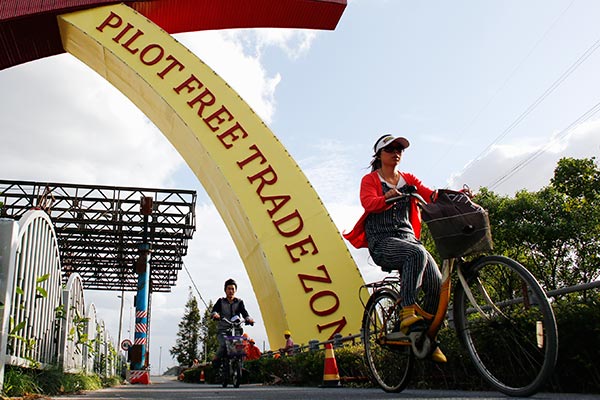
Cyclists ride next to a sign of the China (Shanghai) Pilot Free Trade Zone in Shanghai.[Photo / China Daily]
Zones allow inland regions to diversify manufacturing and geographic advantages
The development of free trade zones will create a competitive edge for China to tap supply-side reform and the Belt and Road Initiative, as well as allow inland regions to diversify their manufacturing and geographical advantages, senior commerce officials said on Dec 26.
Commerce Minister Gao Hucheng said China has introduced 19 practical measures on the investment environment, administrative reform and policies to assist innovation gained from the operation of its four FTZs.
Approved by the central government in August, the country will open another seven FTZs-the third batch, including Liaoning and Zhejiang provinces, to create new market growth points for both trade and investment.
FTZs offer greater access for global companies to expand in China and for Chinese companies to move their capital to overseas markets in diverse services and financial operations such as e-commerce, manufacturing and logistics.
“Based on statistics between January and November, China is expected to gain $126 billion in foreign direct investment from the non-financial sector in 2016,” Gao said at the ministry’s annual meeting in Beijing.
The third batch of FTZs are expected to be officially launched as early as January, according to the Economic Information Daily.
Tang Wenhong, director-general of the ministry’s department of foreign investment administration, said the nation will further simplify and modify four foreign investment laws and encourage foreign companies to invest in the country’s central and western regions next year.
“China’s modern service businesses, environmental protection, communication and information services, as well as high-tech industries will offer more market access to foreign investment in 2017,” said Tang.
“Foreign companies have discovered that market demand in China is changing as both consumers and companies want to purchase more high value-added products and there is a surging demand for services,” said Li Gang, vice-president of the Beijing-based Chinese Academy of International Trade and Economic Cooperation, the ministry’s think tank.
Li said because the service infrastructure facilities of China’s central and western regions are not as advanced as those in eastern regions, foreign companies are keen to enter markets which have yet to fully develop.
“The upcoming Hubei FTZ could possibly cut companies’ financial costs in the area,” said Fu Cheng, chairman of Exsun Electronics and Information Technology Inc, a company manufacturing satellite positioning systems in Wuhan, capital of Hubei province.
He said if the Hubei FTZ adopts the operating mode of Qianhai in Shenzhen, where inter-company transactions are tax-free, and businesses pay taxes annually instead of monthly, then liquidity costs will be significantly reduced. Now companies have to pay tax as long as transactions are billed, even if customers have yet to pay.
